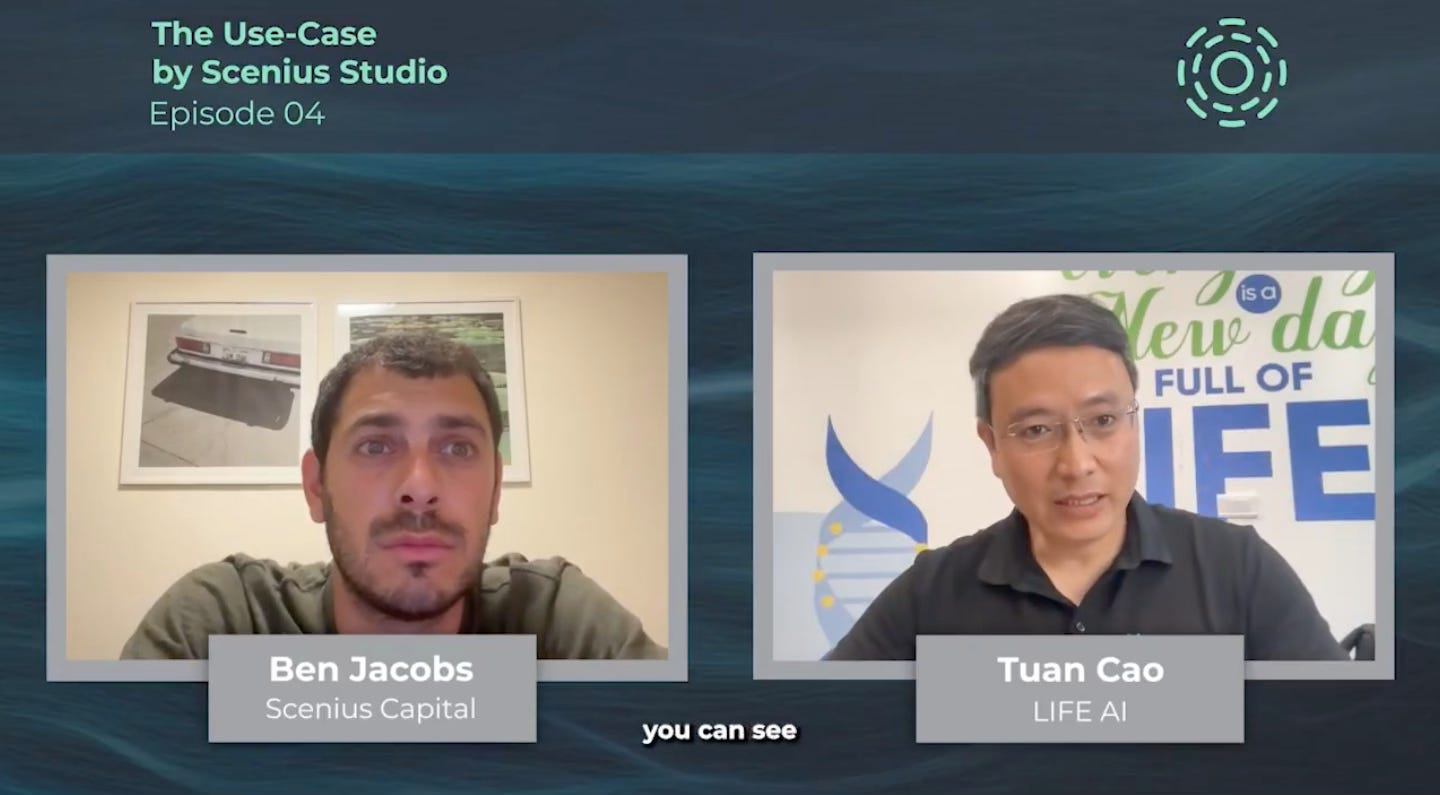Life AI: Revolutionizing Genetic Data Sovereignty with Web3 and DeSci
Imagine a world where YOU own your genetic data, control who accesses it, and contribute to science without sacrificing privacy. Life AI is making this a reality. 🌍
🌐 In the rapidly evolving world of decentralized science, Life AI is setting a new standard—empowering users to own, control, and benefit from their genetic data through blockchain technology.
Inspired by The Use Case podcast with Tuan Cao, we explore how Life AI is revolutionizing genomics in Asia and redefining data sovereignty in the age of Web3.
Life AI - Tuan Cao
A Web3 genomics startup enabling user-owned, NFT-secured genetic data with end-to-end encrypted analyses logged on-chain, serving 112K+ users across Asia and raising $12 M to power modular DeSci subnets in personalized health products, AI training, drug discovery, and traditional medicine.
Founded in 2017 as a Web3 alternative to 23andMe, Life AI is redefining genetic testing with a focus on the Asian genome. Using blockchain-powered Gene NFTs, users hold encryption keys to their data, ensuring full ownership and transparency. Every access attempt is logged on-chain, secured by end-to-end encryption and Trusted Execution Environments (TEEs). No more wondering who’s profiting from your DNA! 🧬
Why This Matters
Traditional genetic testing companies often retain and monetize your data, sometimes without clear consent. Life AI flips this model, empowering users while fueling Decentralized Science (DeSci). Think of it as the “Android” of genomics—open, community-driven, and transparent—vs. the closed “iOS” systems of legacy providers.
Real-World Impact
With more than 112,000 users across 7 Asian countries and $12M raised from VCs like Blockchain Ventures, Life AI is scaling fast. Their partnerships are game-changers:
Kalbe Pharma (Indonesia) used Life AI to launch a stroke prevention tool in just 04 months at 10 times cheaper.
The Volunteer Medical Association (Thailand) integrated over 01 million health records into Life AI for precision medicine.
Hue Central Hospital (Vietnam) partnered with Life AI to conduct the region’s largest autism genetics study on 5,000 patients with only USD 10K budget.
And these are just the beginning. LIFE AI is actively collaborating with hospitals, universities, and healthtech pioneers across Asia to build a self-sovereign healthcare ecosystem grounded in genomic trust and community-powered science.
Beyond Genomics: Modular Subnets (The future of DeSci Applications)
Life AI’s vision extends far beyond personal genomics, which gets users genuinely excited about the future possibilities. Their modular subnet architecture powers four distinct verticals:
E-commerce (Personalized health products tailored to your genome):
A marketplace for personalized health products based on your actual genetic makeup. Imagine supplements that ACTUALLY work for YOUR body, not generic recommendations.
AI Training Platform (AWS-like platform for genomic AI breakthroughs):
A ready-made AWS-like environment for genomic AI training. The potential for accelerating medical breakthroughs here is staggering.
Drug Discovery (Streamlined biopharma research for faster cures):
Streamlining workflows for biopharma research. Faster, cheaper drug development means more cures reaching more people.
Westernized Eastern Medicine: Eastern Medicines are made by combining tens or hundreds of individual plant-based elements. There is hardly any formula on how to combine those elements. Most of the time, someone just adds some elements and removes others, to make a new medicine. While many Eastern medicines are considered supplements, they work much more effectively on curing/eliminating chronic diseases. LIFE AI Subnet supports westernizing these proven eastern medicines to produce the most optimal ones.
As someone who’s always been curious about traditional medicine but skeptical without evidence, this is the perfect bridge between ancient wisdom and modern science.
The Future of DeSci
Tuan Cao explained DeSci by comparing it to something we all understand: iOS vs. Android. Life AI positions itself as the “Android” of genomics, open, community-driven, and transparent; while traditional genomic companies operate like closed “iOS” systems.
The technical architecture is genuinely next-level. Your data stays encrypted within special environments, and the blockchain meticulously logs every access attempt. This prevents unauthorized sharing while simultaneously empowering legitimate researchers with verified, consent-driven data.
While other DeSci players like BioProtocol and ResearchHub focus on open science publication and biobank integration, Life AI’s laser focus on user control sets it part in a way that resonates deeply with people.
This transforms healthcare into a value-driven, participatory ecosystem that rewards purpose and action, not just data.
Life AI isn’t just another blockchain project or genetic testing company, it’s a movement. It represents a fundamental shift in how we think about our most personal data. By combining blockchain, secure computing, and user-centric design, it’s paving the way for a future where scientific progress doesn’t come at the cost of personal privacy.
Author Note: I came away from this podcast feeling genuinely hopeful about a future where we don’t have to choose between contributing to scientific progress and maintaining control over our most intimate biological information. As Life AI scales its subnet system. I’ll be watching closely, this could redefine what it means to own, control, and benefit from our genomic blueprint.
💭 Have you used genetic testing services? Would you trust a model where you control your data? Let’s discuss!
Inspired by “The Use Case” podcast with Tuan Cao of Life AI.
Link to listen below.
Spotify: https://lnkd.in/gk9gC525
Apple: https://lnkd.in/gsqNmmSz




